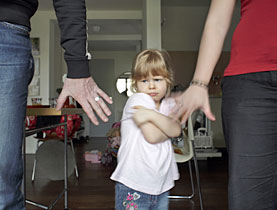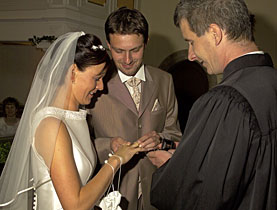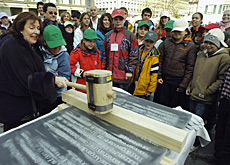“A child needs both parents”

Joint parental responsibility for children should become the norm for couples that divorce or separate, say Swiss campaigners.
Members of the newly formed Swiss Co-parenting Association held a demonstration in the capital, Bern, on Saturday to highlight the current situation, which they claim causes “undue suffering to children”.
The rally coincided with the official launch of the organisation, which comprises 13 regional groups.
According to the Federal Statistics Office, joint parental responsibility was pursued in 15 per cent of divorce cases in 2000 – when it was first introduced, and in 30 per cent of settlements in 2006.
For the co-parenting association, this figure is far too low, as “a child needs both parents”.
The organisation wants joint parenthood and forced mediation to become normal practice so that children’s rights are properly respected.
This position is in line with a proposal put forward by Christian Democrat parliamentarian Reto Wehrli, and is expected to be taken up by the government.
The Federal Justice Office is due to prepare a draft law modification on the issue later this year.
“There really is a problem regarding parenthood, post separation or divorce in Switzerland,” Patrick Robinson, spokesman for the Association of French-speaking Fathers’ Organisations, told swissinfo.
“There is lots of undue suffering caused by aspects of the current law and certain aspects are not taken into account by the judiciary”.
Unique
Switzerland is rather unique in Europe, as until eight years ago parental authority could only be attributed to one parent. The divorce law was changed in 2000 allowing it to be shared. But it states that if one parent disagrees, joint authority is refused.
“It’s inappropriate to bring this issue of authority over children under divorce law, as an increasing number of children are born out of wedlock. It has ended up becoming an added source of conflict, worsening the relationship between parents, and children have unduly suffered,” said Robinson.
“I think we should move towards talking about co-responsibility for children whether married, unmarried, separated or divorced.”
But Social Democrat Maria Roth-Bernasconi is not sure that imposing joint parental responsibility would be a good thing.
She felt shared responsibility for children should be linked to joint custody rights over children.
“In the majority of cases, it’s the mother who is responsible for the day-to-day affairs. Fathers shouldn’t be able to just gain controlling rights and benefit by no longer assuming their financial responsibilities,” she said.
Joint responsibility
For Lucien Jacquemettaz, president of the Jura Fathers’ Movement, joint custody is not for every parent, but joint parental responsibility should become standard practice so that both parents take part in their children’s important educational decisions.
This is problematic when one of the two parents exercises their rights without assuming their responsibilities, he added.
The co-parenting association is calling for the introduction of forced mediation at the start of separation proceedings, which has been successful in Canada, parts of the United States and Germany.
Instead of going to court, the association proposes that judges should tell couples that intend to separate to see a mediator and come back when they have proposals to share responsibility and cooperate for the child’s wellbeing.
It argues mediation is less costly for families in terms of finance and psychological impact, as well as for the state.
Mediation
Fifty per cent of cases of separation or divorce are conflictive and 25 per cent of cases are very conflictive, said Robinson.
“Through mediation, instead of working on a loser-winner basis, the mediation would aim to address each parent’s positive elements which they can build on,” he added.
Under the current regime, courts in French-speaking Switzerland seem more supportive of joint parental responsibility than their German-speaking counterparts.
In cantons Geneva, Neuchâtel and Vaud, this solution has been pursued in around 40-50 per cent of cases, while it ranges from zero to 15 per cent in majority German-speaking regions.
“Judges are slow to take up the new laws,” said Robinson to partly explain the differences.
He also pointed the finger at the legal profession: “There are powerful lobbies working on behalf of lawyers in national and cantonal parliaments that don’t want mediation to take off as it would take away their business.”
swissinfo, Simon Bradley
In 2007 there were 40,100 marriages in Switzerland, 300 more than in 2006. This figure has remained more or less stable for the past decade.
There were 19,700 divorces concluded in 2007 compared with 21,000 in 2006, a decrease of 6%. But 2006 was a divorce high point: 18% more than in 2005.
Under Swiss law a person wanting to file for divorce has to wait two years from the time of separation.
In Switzerland 44% marriages end in divorce
Switzerland:
2.4 divorces per 1,000 inhabitants (2004).
European Union:
2.0 (2002)
Britain:
2.7 (2002)
Finland:
2.6 (2003)
France:
2.1 (2002)
Spain:
1.0 (2002)
Italy:
0.7 (2002)

In compliance with the JTI standards
More: SWI swissinfo.ch certified by the Journalism Trust Initiative




You can find an overview of ongoing debates with our journalists here. Please join us!
If you want to start a conversation about a topic raised in this article or want to report factual errors, email us at english@swissinfo.ch.